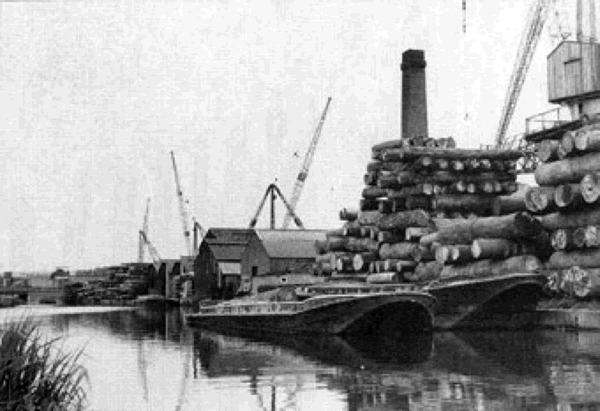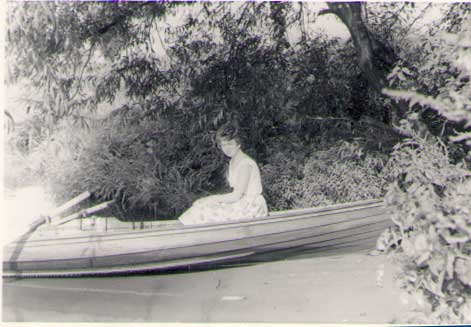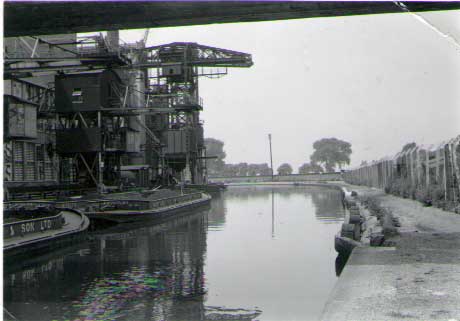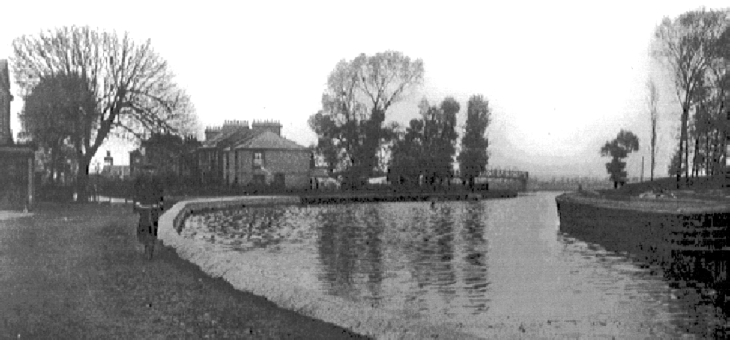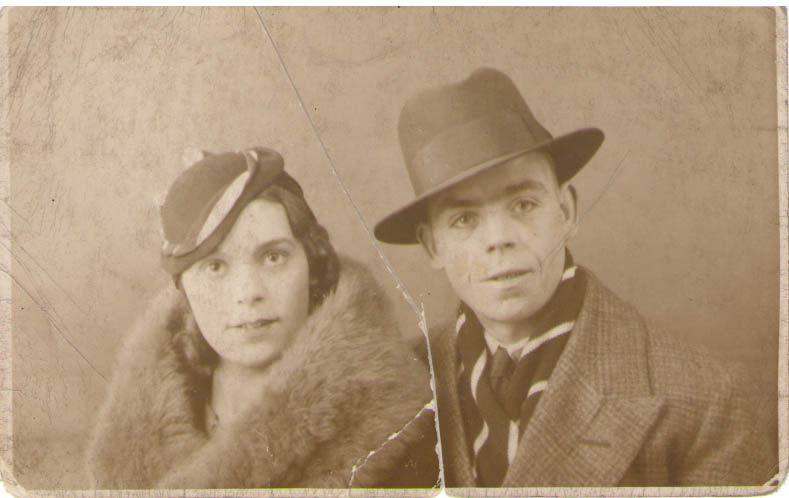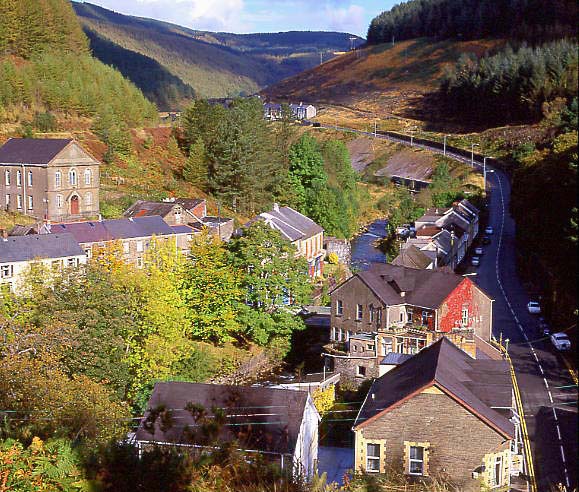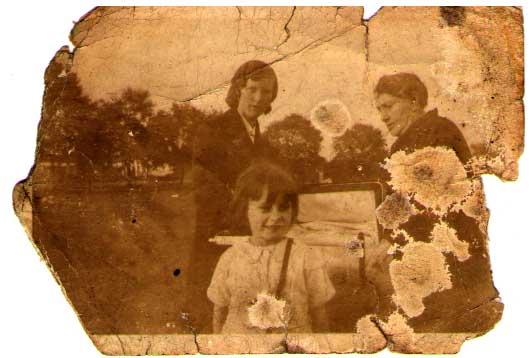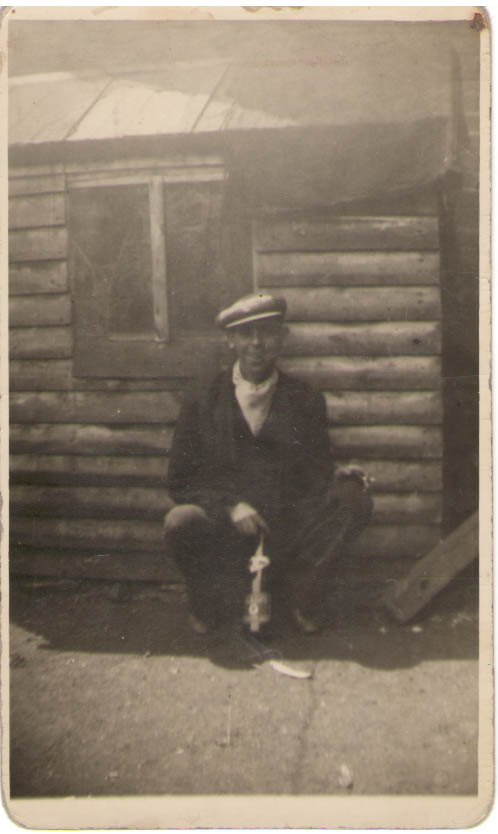The River Lea
As a boy, Dad would always be ready to make a few pennies, he would retrieve logs and planks of wood that floated down from the many timber firms along the Lea, they often fell from the barges that were used to transport them. He had no trouble selling them. He worked in the boat yard that was opposite the cottages and when the Magnificent Fair would visit Lea Bridge, he fetched water and cleaned the horses for the Showmen. The fair attracted hordes of people from all over the East End and Dad saw the potential to take a few bob from them. As a small boy he made a Grotto (or grotter as he called it) on the tow path, the grotter was made of mud and clay and decorated with bits of china or glass, buttons and bottle tops, the punters passing by dropping coins into his bucket. Another wheeze was very lucrative but eventually proved to be an embarrassment. At the bottom of the garden, immediately next to the tow path was the family Bog, outhouse, Kahzi or whatever you like to call it, anyhow there not being any public toilets about the area, he cleaned up, If you pardon the expression! To boost trade, he would stand by the back gate and shout to the oncoming crowds “Piddle and Poop a Penny”. Not too much finesse, but successful. When he started to notice girls, he tried to chat up one beauty in Mare Street, only to be told “I wouldn’t go out with you, You’re old ‘Piddle and Poop a Penny” On a more macabre note, many people perished in the river, by accident or on purpose, the depression added to this last category. It was not uncommon to find a ‘floater’ and if you pulled the unfortunate onto the tow path a fee was paid, but only if it was taken to one particular side. You see the Lea is the boundary between Essex and Middlesex, one county paid 7 shillings and 6 pence, the other absolutely nothing, so it made sense to push the Body to the more lucrative side. I once asked my Dad if, when business was slow, he was tempted to ‘help’ someone into the drink, he looked at me with disgust!
In my time there have been many disastrous incidents along the Lea, I do not feel like dwelling on this subject except to mention one particular tragedy. A young man of about 28, who was from a well known family, the Woods, was in the habit of walking his dog along the river every evening, one evening the dog returned home on it’s own, prompting a search. The result was young Woods was found drowned along with a young orthodox Jew ( a Frumme) It appeared that the Jewish bloke had somehow fallen in the river and young Woods had heroically jumped in to save him resulting in both of them dying. People all over the area were devastated . I remember well the riverside service with Jews and Christians sharing the grief.  The Buskers' Pitch, occupied by the Salvation Army! Behind the stalls where Hannah sold her sweets stands the old schoolhouse, still there today The river at Lea Bridge was an attractive place with three lively pubs, a small permanent fair and cockle stalls all adding to the natural allure of the river and the Marshes. On bank holiday weekends, a vast fair or circus arrived at Lea Bridge bringing with it thousands of merry makers all bent on having a good time. Extra buses were laid on in order cope with the heaving throngs. The pubs did brisk business, queues formed at the cockle stalls and crowds jostled along the river bank. All these punters attracted street performers, jugglers, singers, Accordion players and - perhaps the most popular act -the Escapologists. These two scruffy geysers who always looked like someone had stolen their soap knew how to play the crowds, first they laid out all their heavy, clanking chains in a big circle, the inside of this circle was their performance ring A large dusty canvas sack was thrown into the ring and a dozen or more even heavier locks, shaken out onto the ground. All the time this was taking place, one of the ‘soapy ‘duo kept up his schmooze telling all and sundry how difficult and dangerous the forthcoming feat was, and how. because of the danger they could not get insured so please be generous when the hat came round. When the hat did go round, the schmoozer would look at it with contempt, declaring that it was not enough and that he just needed ‘Ten Sporting Gentlemen ‘ to offer two bob each and the escape could be attempted. Sometimes it took ages to get this amount, people being reluctant to part with such a substantial amount. By the time the requisite amount was procured, a lot of the crowd had lost interest, at this stage the sack was shaken and interest was revived. Now, the escapologist, who was always stripped to the waist, showing even more dirt stains, climbed into the sack. The schmoozer kept up his commentary, inviting ‘strong men’ to pick up the chains and tie and lock the grimy one in, using all the locks. More theatrical groans from inside the sack and a crack from a whip and the escape finally started. You have never seen such struggles and wriggles and heard such sounds of straining, Finally the strongly locked chains didn’t seem so strongly locked and old ‘soapsuds’ emerged from the sack looking more dirtier than ever. The crowd moaned in disappointment and dispersed sullenly. My Dad would tell of a similar performance when he was a boy, but instead of escaping from a sack, the star performer would bite the head off of a rat! He must have been related to the dirty duo! On an island, Mr. Radley hired out rowing boats The place where the boats were stored was nicknamed ‘Radley’s Creek’ and when my Dad was in one of his frivolous moods he would tell us of ‘The Great Battle of Radley’s Creek’, his tongue firmly in his cheek.
In Radley’s Creek lay an old rusty iron clad boat, on this boat lived a unique family. Mum and Dad, their son and daughter, the cat and the dog all had the reddest hair you have ever seen. The rustier the boat became, the more ginger they became, No prizes for guessing their nickname! The river when I was a kid was a dumping place for all kinds of unwanted objects as well as the waste products of the many businesses along it’s banks. Old furniture, dead animals, kitchen waste were dumped with impunity. Objects that were once fashionable but now were redundant could be seen drifting by, but nothing could be more bizarre than the sight I saw one morning. Someone had dumped a large amount of Stuffed animals into the water, two wolves, deers, one with a magnificent spread of antlers, beavers, cranes, small mammals and a massive grizzly bear lay lifeless, their glassy eyes staring emptily, as the steady flow of the water transported them silently to who knows where. It was strangely fascinating, the memory has never left me. The three pubs also attracted hordes of pleasure seekers and more than their fair share of conmen and scheisters. (Stand by for another Tale of the Old Iron Pot.) Most houses on the East End were plagued by bedbugs. They bit like hell, carried a social stigma with them and were very difficult to get rid of, so when a man did the rounds of the pubs promising to eradicate all these obnoxious pests the punters couldn’t get their money out quick enough. In return for their dough they received a very nice white envelope filled with a very potent looking bright red powder. Of course this powder never had any effect whatsoever on the ‘steam tugs’ and feelings ran high, so when the fraudster was caught scraping the red powder from the bricks of the houses that were nearby a small crowd had him up against the wall in an angry confrontation. “How can we kill bugs with this brick dust ?” asked one irate customer, “It’s easy” said the cheeky charlatan “You tickle the bug under the arm, and when he opens his mouth to laugh, you throw the dust down his throat and choke the bastard”. Now don’t blame me for this story, my Dad told it to me!.
The lightermen or bargees were not the big strong suntanned men we romantically imagine them to be, but to me looked old and feeble. I often wondered how they managed to control these massive vessels and handle the giant horses that towed them. I think the truth that their seedy looks were down to the vast amount of booze they imbibed. Two very well known and popular river men led me to this theory. Old Bill Cowley and his mucker Lino drank so much they should have had a brewery named after them. They were in the ‘Head’ every night sitting quietly concentrating on the matter in hand. Sometimes, without warning, Bill would stagger up to the stage and attempt to sing, usually he only managed a snatch of a song and would put his own interpretation on it, for instance “Tiptoe through the Horse Dung” or “Shepherd of the Conger Eels”. His mate Lino was a tubby, amiable bloke with a boozer’s raspberry nose and a wonderful smiley face. They both walked as though their legs were mad of rubber. They were liked by everyone. Once when I asked my Dad why he was called ‘Lino’, his answer was “because he was always on the Floor” Probably one of my Dad’s jokes again! Right next to the bridge at Lea Bridge ,on Middlesex Wharf, was a bit of waste ground that was fenced off with corrugated iron sheeting. The enclosed yard was triangular on shape so it is no surprise to know that we always referred to it as ‘The Triangle’. This yard was rented to small businesses, I can remember it being a scrap metal dealer’s yard., a car breaker’s yard and when Trams and Trolleybuses came to the end of their useful lives, they were squeezed, one at a time, into this very small enclosure and dismantled. All these tradesmen merged into the activities of the wharf, but one new tenant caused a bit of a stink, literally! He was a ‘Knacker’, if you are not familiar with this word, he slaughtered and disposed of horses, Just opposite in the derelict cottages that ran the length of the wharf someone else kept pigs, so there was a bit of apprehension about the possible smell that might waft from the slaughter yard, well let me tell you that these concerns were well founded. Nobody could have imagined the strength of the ‘pen and ink’ that hung around the yard and somehow seemed to attach itself to anyone who passed by, nor could they have known the number of flies that came to see what the stink was about. Much worse was the copious amounts of blood that flowed from the triangle, under the corrugated fence, across the towpath and into the river, making muddy, bloody puddles that pedestrians on the path tried to leap over, mostly unsuccessfully. If you think that things could not be worse, you are wrong, because some of the knacker’s workers decided to ‘have a giggle’ and cut off a couple of horses heads and mount them on long poles and place them against the fence so that they stared ghoulishly at the many people passed along the very busy Lea Bridge Road. Well, as you might expect, not many people saw the funny side of this thoughtless prank, in fact a report in the Hackney Gazette said that passengers on buses were physically sick, children screamed with fright and one unfortunate individual fainted, splitting his head open. The knackers yard disappeared as fast as it had appeared! On the other side of Lea Bridge Road, on the towpath, against the wall of the waterworks, was ‘The Schpiel’, or to you, a pitch for gambling. Most days, the punters or schpielers would gather at this working class casino, complete with a pocket full of coins. The games were very basic and required little skill, but a big dose of luck could be handy. ‘Up the Wall’ or ‘Odds and Evens’ were most popular, the names describing the simple rules. Up the Wall simply required the schpieler to land his coin the nearest to the wall, not too much of a challenge, and Odds and Evens saw two coins being laid on the palm of a flat hand and being tossed into the air. As the coins fell to the dusty footpath the players would shout “Odds” or, you’ve guessed it, “Evens”. If the coins matched, it was Evens and if……oh I suppose you have guessed the rest. This gambling was, of course, illegal, so us younger kids would be employed to sit on the high wall of the waterworks to ‘keep dog eye’ for the old Bill. The shilling that we got for our vigilance was easy money because the constabulary only came ‘by appointment’, I’m sure. On the rare occasion of a raid, a couple of schpielers got fined a token Five bob or even less, and business continued as usual. Well not quite as usual, because immediately after a raid, there was no chance of any interference, so numbers of punters swelled. I feel I must mention old ‘1-2-3’, our nickname for an ancient ‘river copper’. He was employed by the Lea Conservancy, not the normal police force and must have been a copper for years. He just rode his bike up and down the towpath at the slowest speed you can imagine, hence ‘1-2-3’. He wore full police uniform complete with helmet and had his glasses on the end of his nose, giving him a ‘dozy’ look. When he rode passed the schpielers who were all shouting and jumping up and down, he somehow seemed not to notice them! It seems that this gambling on the towpath was not just a fleeting fancy, but a long established ‘sport’. There is an old Music Hall song about one of the local hardnuts who is bullied by his tiny wife, the song is called “It’s a Great Big Shame” There is a line in the song which states “On a Sunday morn, with a dozen pals or more, He would play at Pitch n’ Toss along the Lea”. This song, sung by Gus Elen was written in 1895, so the practice of pitching and tossing on the towpath must have been well established then, who knows how far back in time this illegal pastime goes? Just opposite the Schpiel, on the other bank was the Power Station. This enormous edifice provided the electric supply for a large part of London and was powered by coal. This coal, in the form of coal dust, arrived in lighters (barges) and was unloaded by an over head ‘grab’. The river was pretty much polluted and definitely smelly, but this did not deter us from swimming in it as soon as the warm weather arrived. With no fear of the obvious dangers, we would dive from the bridges and climb onto the lighters. One of our party tricks was to descend into the hold of the barge, roll in the coal dust and emerge as ‘black as coal’ from head to foot. After parading in our newly acquired devil-like disguise, a head dive into the Lea would see us emerge as clean as a whistle. It never failed to amuse onlookers! The New BoyUnlike today, we knew every person and where they lived, for streets around, so when anyone new moved in we were eager to find out about them. A couple, along with their young son got a flat in the then very modern Maisonettes just opposite our place. Me and two of my mates, unable to control our curiosity any longer decided to knock on the door. The door was opened by a rather smart woman who said in a well spoken voice “Hello, what do you want?” We automatically tried to put our ‘nice’ accents and said, like the angels we hoped she thought we were “Would the new boy like to come out to play?” We could see that the lady was touched by our impeccable manners and quite moved by our courteous offer “Do come in “she gushed and lead us into the living room. The room was like nothing we had seen before, expensive furniture, ‘arty’ pictures on the walls and best of all a shiny black upright baby piano, complete with hand written music on the stand. “Raymond “she said, “these lovely boys have asked you out, would you like to go with them?” The somewhat sullen Raymond agreed and after we were given glass of milk and a biscuit each, we were lead to the door. As we left we could hear her saying to her husband “What lovely boys they are!” Outside, Raymond was just as sullen, so we asked him if he would like to see our ‘camp’. He perked up at the thought of this and off we went. What we forgot to tell Raymond was that the camp was in James Latham’s wood yard and that we had to scale an 8 foot fence to get to it We were seasoned fence climbers and were over in seconds, poor Raymond didn’t have a clue so we went back and humped him to the top of the obstacle. Raymond held on to the fence top as if his life depended on it until we got a plank of Latham’s finest timber and made a slide for him. This slide was handy for getting back over the fence too. Inside the yard, as you may expect, were many large stacks of timber very close together, and with a few planks laid across the gaps we had the ideal shelter and camp. Inside our cosy camp we held pow wows, re-enacted scenes from the latest cowboy films and planned grand adventures that we knew would never materialise. Now what I have omitted to tell you is that the wood yard was out of bounds, a large sign mounted on the top of the fence boldly declared “ TRESPASSERS WILL BE PROSECUTED”, this sign was very handy to get a grip on when getting over the fence. There was also a night watchman or ‘Watchy’ as we called him. This particular watchy was pretty ancient and he was accompanied by an equally ancient dog. Don’t ask me why but we nick-named him ‘Biscuit Legs’, the dog had a more mundane name of Bob. Back in the camp we were sharpening up some wooden sticks in order to emulate ‘The Charge of the Light Brigade’ when Bob stuck his wet nose in and stared at us in a careless way. We knew that old Biscuit Legs would not be far behind so up went the call ‘Watchy’. No need to repeat the warning, we were off at speed off across the yard and over the fence back to the safety of the council estate. We looked around and said, as one “Where’s Raymond? He of course never knew that he had to scarper as fast as his feet would take him, I imagined him waiting to introduce himself to Biscuit Legs. We watched from the safety of a porch as the aged Watchy led Raymond by the arm to confront his parents, Bob, equally as aged trailed behind looking fed up with all the palaver. Neither Biscuit Legs nor Bob had ever apprehended any one before, they were content to make intruders disappear by simply shouting, but Raymond’s insistence on staying put had put them to the trouble of actually doing something. Raymond’s Dad opened the door and Biscuit legs and Raymond entered, Bob remained on the doorstep, still looking fed up. We never saw Raymond again and not long after, a removal van was seen outside his flat with two burly men struggling down the stairs carrying a shiny black upright baby piano. Big Sid and Little SidWith the dog tracks ‘racing’ at least twice a week there were meetings every night so demands for Big Sid’s services were at a premium. Punters in the comfort of their own homes would study form, aided by Tipsters in the London newspapers, complicated spread sheets in The Sporting Life and other such means. Some relied on more reliable methods such as the Tea Leaves or the Hatpin. When the winning combination was selected, the information was written on a piece of paper and the paper carefully wrapped around the stake money. The billet-doux was then signed on the bottom, BUT, not with a true name. If, by bad luck the bets fell into the wrong hands, no-one could be identified. This is where I come into the story, when a punter knocked on our door I answered and took the rolled up bet, if I did not recognise the face at the door I would not ‘understand’ them and send them away. My Dad drummed this into me and I never let him down.
I think I was chosen to take the bets because I looked so innocent. When the small packages were collected they were placed in a cut glass bowl that graced the sideboard and then a dish of fruit was laid on top as a subterfuge. There was a cut off time for placing a bet and at that time all the bets were put in a school satchel, I put on my look of innocence and took them to Mr. Trotter. He then told me again that he was faster than my Dad, I faked a grin and went home! Big Sid didn’t have the gambling scene all to himself, there were a few street bookies about, the most memorable was named Sonny. Now Sonny looked just like a bookie should look like. He had a look of prosperity about him, just a little overweight, a luxurious head of swept back hair and always wore a generous overcoat. This overcoat, never buttoned up, had many large deep pockets, an essential tool in his trade. These pockets carried the books, the bets and the cash necessary to complete his dealings. The overcoat was his office. Sonny stood on the towpath at the corner of the wood yard, trying to look as inconspicuous as his flamboyant coat would allow. Punters would saunter by not taking any notice of this blameless figure and at the right time a hand would dart out and a small tightly bound package would drop into the cavernous, inviting pocket of Sonny’s office. From time to time the police would shake him up a bit, but on the whole he had a tranquil life. However one night he must have upset some-one at the station, because a police van and four coppers arrived. Some-one tipped the wink to Sonny and he moved on to the grounds of the flats, but old Bill soon were hot on the trail. A game of cat and mouse took place, bringing a crowd of people out to watch the fun, tenants of the higher floors of the buildings had an overall view of the chase and called down to Sonny, offering advice as to the whereabouts of the law. Well the police were not as daft as they looked and soon collared poor old Sonny. As Sonny was led away to the van, jeers turned to cheers and Sonny turned to his adoring public and took a bow! Welsh Wales
However, Cymmer and my family there are firmly fixed in my head, it’s just difficult to put them into a time. I do know that me and all my English cousins thought that we were in paradise when we were there. We lived at the bottom of the valley surrounded by huge mountains and a raging river beat it’s way over the rocks just at the end of the garden. We all took full advantage of the natural beauty of this schoolboys idea of heaven, climbing the mountains and jumping from rock to rock in the river,( we lost count of the times we slipped and fell into the water). The war came and went but we all continued to visit our dream valley for years to come, becoming a part of the village. South Wales then, was of course the centre of the coal industry, everyone depending on ‘the coal’ for their living. Cymmer was, and still is, in a most picturesque valley with two tumbling rivers meeting in the centre of the village, sheep wandered where ever they wanted and everyone was so friendly, so bloody Welsh! There were about five working pits in and around the little valley and railways connected all pits , and ran to local towns and beyond. We could look down the valley and watch the distant steam trains chuffing along the mountain sides. It was like we had our own train set. I often wonder if the author of Thomas the Tank Engine was inspired by our village. A smell of coal and steam hung upon the air and coal dust dominated the river and the houses. On the rare occasions that I smell coal now, I am taken right back to my ‘Welsh days’ When we climbed the mountains we left behind the smell of coal and entered into another atmosphere, the smell of bracken, heather and sheep dung. All miners were allotted a free coal allowance by the mine. This seemingly generous gift was issued by the ton and a lorry load of coal, fresh from the pit was unceremoniously shot onto the pavement outside the miner’s home. This small mountain of fuel blocked the pavement and had to be carried through the house into the ‘cwch’ in the back yard. Not an easy task, but the solidarity of the pitmen and the common bond they shared made light work of this daunting task. Nearly everyone in the street came out with buckets, tin baths, shovels and brooms and in a combined effort that we don’t see today, shifted the black obstacle into a more suitable place My Mum’s family, the Holmses, consisted of Uncles Will, Arthur, Stan, Ben and George and sister Harriet, In early years Nanny Holmes was still alive. Two more sisters in New Zealand were unknown to me. Strangely, all of the family, except for Uncle George remained unmarried and all lived together in one house at the ‘Bottom’ of Cymmer. This house as you may gather from the many single people living there, was ‘primitive’, hardly likely to feature in a magazine. The spider infested bog was up the garden and the only supply of water came from a tap on the outside of the house. All cooking was done on an open fire that was part of a range, there were gas lights downstairs but a trip upstairs necessitated the lighting of a candle. In spite of these Spartan conditions, us cockney cousins were drawn back time and time again by some mystical Welsh spell that seemed to enchant us soon as we got off of the train.
On return to the house, Aunt Harriet had filled a vast wooden bath in front of the fire and they took turns to soak off the coal dust, all of them using the same water, no such niceties as fresh water. Clean clothes on, a bite of food and a slow meander to the pub, this was their daily routine. Uncle Arthur was the clown of the family, with an almost childish sense of humour. He had a large repertoire of silly jokes, poems and songs, these he would rattle off at a rate of knots and if you giggled at one of them he would repeat it over and over again, laughing throughout. Uncle Stan was the opposite, being mostly silent, and sensitive. He never said more than two words during our two weeks holiday, but when we went to the station to leave, he never failed to shed a tear. Uncle Will, the oldest of the family had the tough appearance of a well worn miner, he had many quite severe injuries and could be grumpy at times as a result. He worked on a farm on weekends with his dog, Turk, more than once taking me to the farm in a pony and trap. I sat in the cart with Turk as the pony splashed through the river, hardly believing my luck. Aunt Harriet was a sweet, shy, loving woman who obviously loved us so much, she fussed about us all the time. When I was older I realised why, because all the family were not married except my Mum, I was the first and only next generation child . Harriet, as well as the house keeper was the village paper girl, delivering the daily papers every day for years well into her more mature years. Uncle George, the only one to marry, lived with Aunty Gert around the corner in an abode with the loveliest name , They lived at ROSE COTTAGE, PLEASANT VIEW,CRAIG Y FAN,CYMMER. Whenever I wrote to them, the address made me happy.
My Mum, then a teenage girl and not yet married to my Dad, took an interest in this little baby and cared for her and would take Joan to Wales whenever she visited. Of course, Mum, in her innocence was surprised and hurt when some of the villagers, who on seeing this attractive young woman who had fled to the iniquitous Metropolis, had returned with a baby claiming it was a foundling, set about putting two and two together and making a big Welsh four. I, of course was not born then but can imagine Mum telling them in no uncertain terms the truth of the situation. Joan stayed with Hannah and the rest of the Walkers, my Mum taking a large part of the responsibility for her, until Hannah died. She started school in London and even called herself Joan Walker and and was destined to be another of the Walker clan, when for some inexplicable reason at the age of six, visited Cymmer and stayed with Nanny Holmes and never came back. She was brought up by the Holmes family , grew up, got married , had four children, and has now got an uncountable number of grand children, great grand children and a cat. I have always had a pride in the fact that this wonderful family warmly took in and provided for such an unfortunate child, so feeling, so caring, so Mary Poppins! It always gave me a warm glow, knowing that the Walkers had looked after their own in true East End style. Well, Joan never quite saw it like that, I knew that she always wanted to find her Dad and that a certain amount of rejection was felt by her because she would, whenever we spoke, ask if anyone had seen her Dad. The fact is I don’t think she had seen him since he gave her to Hannah. Naturally she wanted to find out about her family and with the help of my sister Eira, traced the records of her Mum, finding the cause of , the date of and the place of her death. What’s more she found her grave and at the age of 70, Joan with Eira finally laid a bunch of flowers on her Mum’s place of rest. The grave was in Chingford Cemetry and as Joan said “Near the bloody Kray twins”. Although she recognises that her Dad died many years ago, I know she somehow thinks he may possibly be waiting somewhere for the opportunity to meet her. Recently when we were talking about her feelings of rejection, I foolishly placated her by telling her that she should take comfort in the fact that the Walkers took her in and cared for her. “Did they?” she snorted , “they sent me off to Cymmer to get rid of me!” I suddenly saw the simple truth of it. Mary Poppins it wasn’t. Then she suddenly asked me “How would you like me for a sister?” I didn’t understand what she was alluding to, then the penny dropped, the rumour that my Mum was her Mum re-emerged , she denied it and laughed saying she had her Birth Certificate, her Mum and Dad’s Wedding certificate and a photo of her Dad. I never took it seriously and we both laughed, I told her that she had always been special to me and that I had, since childhood, thought that she was very beautiful and I loved her. “Well, “she said, “my husband till the day he died believed I was Aunty Tilly’s daughter, your sister”. The idea was on my mind for the rest of the day - was it possible? Why was she sent to my Welsh Nan? Why was she called Walker at school in London? Perhaps this was the reason for Mum’s depressions. The case for her being my sister was building up and I kind of warmed to the idea. I don’t think she is my sister, but I know both Eira and me would be proud if she was! There was one more member of the Welsh family so far not mentioned, Uncle Ben. Ben lived with all the other unmarried Holmes’ and was by all accounts the apple of quite a few eyes. He worked in the pit like all of his brothers , deep under the Welsh mountains, hewing coal in terrible and dangerous conditions, so when he was given a job working on the surface he thought that his life was to be less harrowing and dangerous. Added to this, he was in the fresh air and the daylight, he was so thankful! At the pithead, coal that was brought to the surface was loaded into ‘drams’, the drams coupled together and pulled by a cable up a steep ramp that eventually tipped the contents of the dram into waiting railway trucks. Ben’s job was to make sure that the system kept running smoothly, a piece of cake after the back breaking work underground. This life of comparative comfort came to an abrupt end when suddenly and with no warning the main towing cable snapped, causing the cable to ‘whip’ and strike Ben, sending him through the air for some considerable distance. He was killed instantly. With him died the peace and happiness of the Holmes family and the romantic hopes of one particular member of the wider family. This was in 1943, so I don’t remember much of Ben, but I can remember being on a bus in Mare Street, Hackney, with my Mum who was sobbing uncontrollably, so much so that a kind old lady came to her help and listened to her as she told her the tragic tale. Such heart-breaking stories abound in the Welsh valleys, I have heard many of them. Perhaps that is why I so passionately give my support to miners and their causes. Happier TimesIn spite of the hard and rigorous life they led ,the people of Cymmer thoroughly enjoyed the simple things. No grand theatres and casinos but instead a corrugated hut that housed the fish and chip shop and a hall at the back of the co-op that housed the cinema. The fish shop, so small that only a handful of customers could squeeze in, was owned and run by the Gazzi family. You can see by the name that they were a Welsh-Italian family and as well as the fish and chips they sold ‘Real Italian Ice Cream’, made in Cymmer of course. Across the road, up a steep hill, sat the entrance to ‘The Cosy, Cymmer’, the aforementioned picture house that was part of the Co-op building. This, anything but cosy cinema sat about 40 people and had wooden seats that numbed your bum before the interval arrived. When the interval did arrive, the lights were switched on and the entire audience left the building and scurried across to Gazzi’s for the compulsory Chips and an Ice Cream. I feel sure that the timing of this interlude was a collaboration between the Cosy and Old Gazzi, because the second half of the programme would never begin until all the fish and chips were consumed. By now, of course, the picture house reeked of vinegar and chip fat, so as the main feature was beginning, an attendant would stroll the one and only aisle and squirt every one with a hand pumped spray containing some obnoxiously sweet smelling concoction, causing a feeling of nausea and almost prompting the interval feast to reappear. All this, of course made such an impression on me that I can remember it in such detail. The film programme was changed twice a week, and the films sent to the next village just as the new films arrived from the previous village, so if by any chance you missed a film, a short bus ride soon remedied that. Some Other Enchanted EveningWhen I was 16, I paid my annual visit to Cymmer and found that the things that thrilled me so much as a kid never held the same excitement for me. The river, as beautiful as it was, didn’t seem to rage over the rocks as fiercely, and the mountains didn’t appear so looming. You see, I had entered a different stage in my life and there were new territories to explore. When I walked through the village, I was recognised, “Hello, you are Tilly’s boy, aren’t you?” I was often asked. “See you over the pub later?” Unsure if I was allowed in the pub, and not wanting to appear un-manly, I said “Of Course!" The Farmer’s Arms Hotel was literally feet away from our house, so staggering out of one door and into another was no problem. My uncles, veteran boozers that they were, positively ordered me to join them, so not wanting to seem ungrateful I forced myself to attend that Saturday night. The Farmer’s Arms was in fact a proper hotel, with a wide entrance hall that ran to the back of the building, off of this hall were various rooms and in the middle a serving hatch that strangely was shut most of the time. If anyone wanted a drink, they had to knock on the hatch and give the order that was then delivered on a tray. You simply took the tray and went to whatever room you wanted to. Being Saturday night, most people sat in the ‘parlour’, which had a massive upright piano in the corner. Men and women of all ages arrived, all dressed smartly for what was the event of the week. The older people came very early in order to ensure a seat. As soon as the pianist turned up the parlour took on a different feel, a sign of the joys to come. The Welsh have a reputation for singing and it is richly deserved, because as soon as the first note was struck on the piano, the fine tuneful Welsh voices lifted the most ordinary songs to a level they were never meant to reach. Lots of Welsh songs were included in the ‘concert’ (for that’s what it was) and although they were sung in Welsh I was able to join in, for I had heard these songs so many times that I knew the words, or should I say noises that sounded like the words. I never knew what these words meant of course, but it didn’t matter to anyone. Everything from pop songs to hymns received the finest of efforts. I was thrilled by the fact that without any rehearsal the singers automatically harmonised, sang descants and had an inborn sense of music. A popular song of the day, ‘The Wayward Wind’, a country and western song, was given the Welsh treatment with basses, baritones and sopranos instinctively bringing to this song a quality that the composer could never have dreamed of. I walked the few yards from The Farmer’s to our house with a big Welsh lump in my throat, I was so proud of the little bit of Welsh blood that flowed through my veins. The following morning this Welsh lump had moved from my throat and settled right in my head . This was the result of drinking too much of the local brew, this watery ale looked and tasted like sheep’s pee, but had the kick of a pit pony! I still visit Cymmer from time to time, all the family and friends that I knew are no longer there, except Joan of course, but life still goes on and meeting all of her many family members is a joy. In 2010, my wife and me celebrated our 50th Wedding Anniversary and a few weeks later went to see Joan. When we arrived, Joan said that she was taking us out to a lovely old pub in a nearby village for a meal. Off we went with Joan and on arrival at the pub we were overwhelmed to find nearly twenty people waiting to help us celebrate. They were Joan’s daughters and grandchildren and great grandchildren, some we had never met before. They treated us like royalty and proved to us that the family ties are as strong as ever! |
| brian@tales-of-the-old-east-end.co.uk |
| Website by LAURENCE PAYNE |
| . |
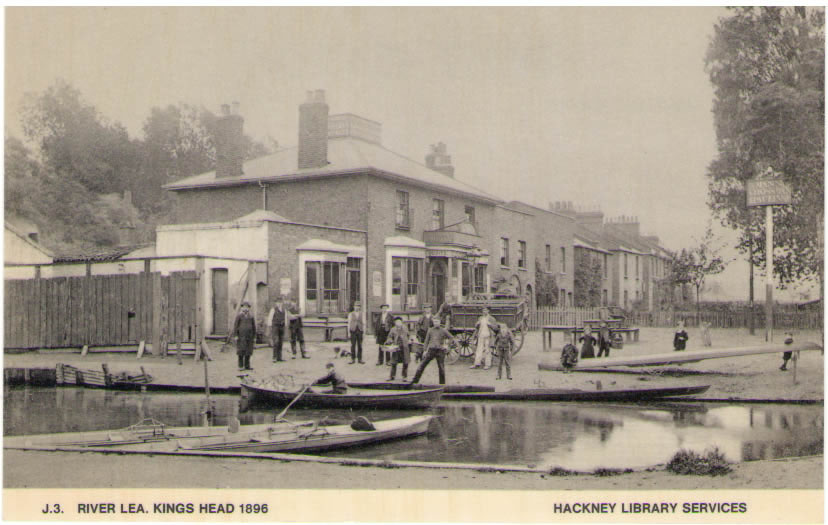
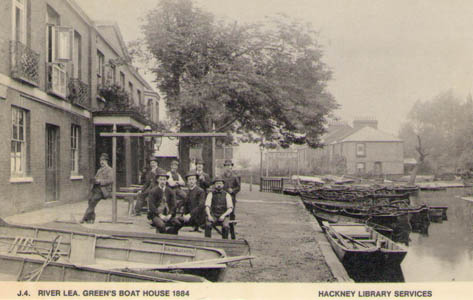
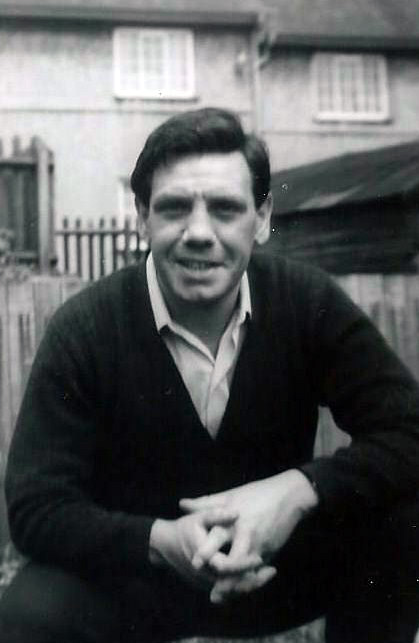
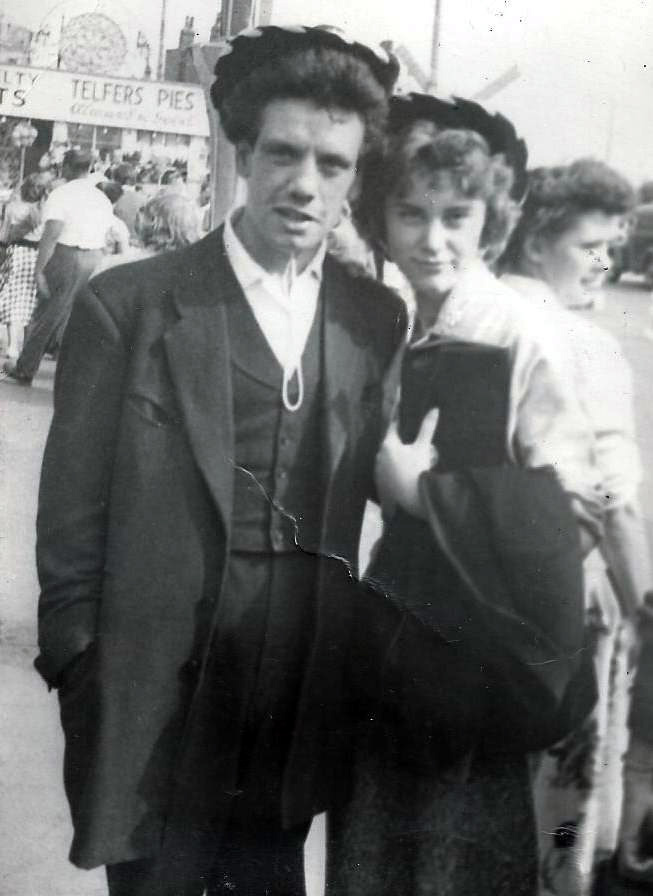 Sadly, Johnno died last year, and at his very well-attended funeral an unknown fact emerged. His full name was John Bannister Truman, apparently he was the first baby born in Bannister House, Homerton. Because of the love and admiration we had for him we should tell everyone that Bannister House was named after him!
Some of the more mature Hackney inhabitants may well remember Johnno from his many appearances in pubs and clubs. He used to bring the house down with his most popular routine: all the lights in the pub would be switched off, Johnno would climb onto the stage with a lighted candle in his hand, then he would sing his own comical version of ‘Glow Little Glow Worm’ and slowly and deliberately blow out the candle to deafening applause. It never failed !
Sadly, Johnno died last year, and at his very well-attended funeral an unknown fact emerged. His full name was John Bannister Truman, apparently he was the first baby born in Bannister House, Homerton. Because of the love and admiration we had for him we should tell everyone that Bannister House was named after him!
Some of the more mature Hackney inhabitants may well remember Johnno from his many appearances in pubs and clubs. He used to bring the house down with his most popular routine: all the lights in the pub would be switched off, Johnno would climb onto the stage with a lighted candle in his hand, then he would sing his own comical version of ‘Glow Little Glow Worm’ and slowly and deliberately blow out the candle to deafening applause. It never failed !